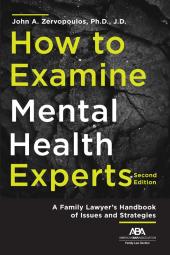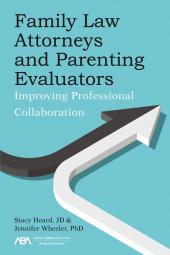2020 How to Examine Mental Health Experts: A Family Lawyer's Handbook of Issues and Strategies
Select a format
 International Order Inquiry
International Order Inquiry
Select subscription type
Terms & conditions
Subscribers receive the product(s) listed on the Order Form and any Updates made available during the annual subscription period. Shipping and handling fees are not included in the annual price.
Subscribers are advised of the number of Updates that were made to the particular publication the prior year. The number of Updates may vary due to developments in the law and other publishing issues, but subscribers may use this as a rough estimate of future shipments. Subscribers may call Customer Support at 800-833-9844 for additional information.
Subscribers may cancel this subscription by: calling Customer Support at 800-833-9844; emailing customer.support@lexisnexis.com; or returning the invoice marked "CANCEL".
If subscribers cancel within 30 days after the product is ordered or received and return the product at their expense, then they will receive a full credit of the price for the annual subscription.
If subscribers cancel between 31 and 60 days after the invoice date and return the product at their expense, then they will receive a 5/6th credit of the price for the annual subscription. No credit will be given for cancellations more than 60 days after the invoice date. To receive any credit, subscriber must return all product(s) shipped during the year at their expense within the applicable cancellation period listed above.
The total price includes the product(s) listed in the Order Form and any Updates for a limited period (minimum period of 30 days) after the order is placed ("Order Window"). Shipping and handling fees are not included in the grand total price.
All shipments may be returned, at subscribers' expense, for full credit of the Price within 30 days of receipt.
Shipments may not be returned, and no credits will be issued, more than 30 days after receipt.
After the Order Window, subscribers will receive notice of Updates along with the then-current grand total price and order process as Updates become available. Subscribers will only be shipped those Updates they specifically request.
Product description
View a sample of this title using the ReadNow feature.
Do you feel uneasy when preparing to deal with mental health experts? Can you spot, analyze, and address key issues related to their work and testimony? This accessible, updated edition by John A. Zervopoulos, a lawyer and board-certified forensic psychologist, gives you tools to address these concerns. As a result, you'll more competently deal with mental health experts and upgrade your case preparation and presentation.
With new and refreshed material organized in four parts, this book--the companion to the author’s 2015 book, Confronting Mental Health Evidence--unpacks the key question that lawyers should demand of mental health experts: How do you know what you say you know?
Part 1 features calls to think like a lawyer, to wrap your case in a compelling story, and to apply a lawyer's "mindset" when managing experts in depositions and in court.
Part 2 summarizes the four-step PLAN Model--each step based on Daubert/Frye caselaw and on psychology’s ethics, professional guidelines, and literature--that enables you to systematically analyze an expert’s work and testimony, develop effective lines of deposition and examination questions, and organize your oral or written arguments about the quality of the testimony.
Part 3 offers 20 short, handbook-style chapters related to experts and their testimony. Each chapter highlights an issue frequently encountered in case prep and in court, and examines three critical aspects of the issue--spot the issue, analyze the issue, address the issue--to help you more effectively critique experts' qualifications, methods, and assertions. Issues include: how qualified is qualified; recognizing and challenging experts' biases; managing experience-based testimony; and much more.
Finally, Part 4 accents the action, showing how to integrate the book's previous material with procedure and practical strategies to deal with mental health experts at depositions, at Daubert/Frye admissibility hearings, and at trial.
eBooks, CDs, downloadable content, and software purchases are noncancelable, nonrefundable and nonreturnable. Click here for more information about LexisNexis eBooks. The eBook versions of this title may feature links to Lexis+® for further legal research options. A valid subscription to Lexis+® is required to access this content.
Do you feel uneasy when preparing to deal with mental health experts? Can you spot, analyze, and address key issues related to their work and testimony? This accessible, updated edition by John A. Zervopoulos, a lawyer and board-certified forensic psychologist, gives you tools to address these concerns. As a result, you'll more competently deal with mental health experts and upgrade your case preparation and presentation.
With new and refreshed material organized in four parts, this book--the companion to the author’s 2015 book, Confronting Mental Health Evidence--unpacks the key question that lawyers should demand of mental health experts: How do you know what you say you know?
Part 1 features calls to think like a lawyer, to wrap your case in a compelling story, and to apply a lawyer's "mindset" when managing experts in depositions and in court.
Part 2 summarizes the four-step PLAN Model--each step based on Daubert/Frye caselaw and on psychology’s ethics, professional guidelines, and literature--that enables you to systematically analyze an expert’s work and testimony, develop effective lines of deposition and examination questions, and organize your oral or written arguments about the quality of the testimony.
Part 3 offers 20 short, handbook-style chapters related to experts and their testimony. Each chapter highlights an issue frequently encountered in case prep and in court, and examines three critical aspects of the issue--spot the issue, analyze the issue, address the issue--to help you more effectively critique experts' qualifications, methods, and assertions. Issues include: how qualified is qualified; recognizing and challenging experts' biases; managing experience-based testimony; and much more.
Finally, Part 4 accents the action, showing how to integrate the book's previous material with procedure and practical strategies to deal with mental health experts at depositions, at Daubert/Frye admissibility hearings, and at trial.
eBooks, CDs, downloadable content, and software purchases are noncancelable, nonrefundable and nonreturnable. Click here for more information about LexisNexis eBooks. The eBook versions of this title may feature links to Lexis+® for further legal research options. A valid subscription to Lexis+® is required to access this content.
 Lexis Nexis
Lexis Nexis 

